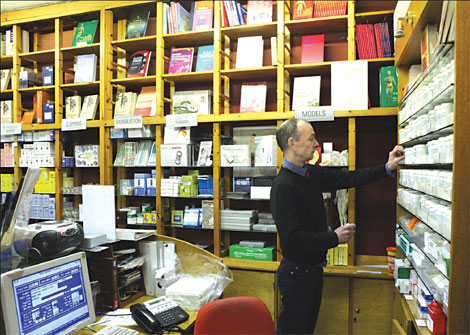A bitter pill to digest
Updated: 2011-05-13 11:35
By Zhang Haizhou (China Daily European Weekly)
 The AcuMedic Centre in London. More than 150 Chinese herbal medicine remedies, mainly those for curing depression, gynecology and skin diseases, are popular in the UK. [Xu Yanhua/For China Daily] |
Uneasy traditional medicine practitioners see light at end of tunnel in new UK regulations
Tucked away in the busy alleyways of Camden High Street in London is AcuMedic, a traditional Chinese medicine (TCM) center that has been slowly making waves over the years. Set up in 1972, AcuMedic is now the biggest TCM shop in the UK and has under its wings several departments, a full-fledged clinic with consultation rooms, a bookstore that gives insight into TCM, a shop that sells Chinese health products like green tea and dried chrysanthemum and a pharmacy that sells herbal medicines.
Mei Man-fong, the founder of AcuMedic, who says he is in his 60s but looks much younger and dapper, settles down for his interview with China Daily with a cup of green tea.
He says that he owes his sprightly appearance to TCM.
Mei says that roughly 500 patients visit the center every week, with the total number of registered patients having crossed 250,000 till date.
His most famous patient was the late Princess Diana who visited the center in the 1990s under the name of "Mrs Wales" for acupuncture treatment to relieve stress.
Recalling those years, Mei says Diana's visit was like a springboard for TCM clinics in Britain.
But the years of steady growth may soon disappear if the new European Union (EU) directive on herbal medicines comes into being fully.
Under the EU's Traditional Herbal Medicinal Products Directive (THMPD), herbal remedies will now only be available on prescription from practitioners and all over the counter medications need to be registered and approved by the Medicines and Healthcare products Regulatory Agency (MHRA).
The MHRA is a British government agency responsible for ensuring that all medicines and medical devices are safe.
"If the THMPD is fully implemented, TCM will face huge obstacles," says Mei, adding AcuMedic sells more than 129 Chinese herbal medications.
Richard Woodfield, the MHRA's head of herbal medicine policy, said in a recent interview that the legislation is important as until now, consumers had no clue on whether the medications were safe for use.
Complicated process
TCM practitioners, however, feel that the procedures are too complicated and due to the extensive quality checks of the ingredients, many Chinese herbal products may not be registered by the MHRA.
Unlike other herbal medicine products, most of the TCM remedies consist of different kinds of herbs.
"The procedures are quite exhaustive. It extends to quality assurance. And the more herbs you have in a product, the more complicated it becomes," says Michael McIntyre, chairman of the European Herbal & Traditional Medicine Practitioners Association.
"That is one reason ... why the THMPD is an unsuitable vehicle for Chinese traditional medicine. Many TCM products have six or eight herbs and in some cases up to 14 herbs," McIntyre says.
Liuwei Dihuang capsules, a classic TCM remedy from the Song Dynasty (960-1279) eras, is one of the most popular remedies in the UK market for kidney nourishment. But the capsules have six herbs in them and each herb may in turn contain several chemical ingredients. With such a complex structure, getting the approval and registration can often be a time consuming and expensive process.
"There are also several other reasons as to why the THMPD is not a suitable vehicle, or a suitable law, for the TCM.
E-paper

Pearl paradise
Dreams of a 'crazy' man turned out to be a real pearler for city
Literary beacon
Venice of china
Up to the mark
Specials

Power of profit
Western companies can learn from management practices of firms in emerging economies

Foreign-friendly skies
About a year ago, 48-year-old Roy Weinberg gave up his job with US Airways, moved to Shanghai and became a captain for China's Spring Airlines.

Plows, tough guys and real men
在这个时代,怎样才"够男人"? On the character "Man"
